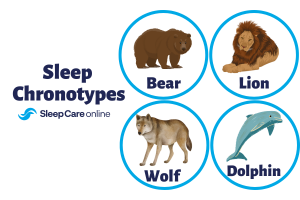We all know people have different sleep behaviors. Some people stay up late. Others are early risers. These sleep and wake behaviors are known as chronotypes, and you may have heard about them in common terms like an early bird or night owl. Chronotypes are tied to our genetics and can tell us much about our sleep health. They also influence your appetite, exercise, and other factors.
How are Chronotypes Determined?
The strong genetic connection of chronotypes helps researchers understand how we sleep individually, which is critical for understanding our personal sleep patterns. While broad sleep pattern research is helpful for better understanding sleep in general, identifying individual chronotypes can help a person manage a sleep disorder by better interpreting their sleep needs.
What are the Four Chronotypes?
Chronotypes vary from person to person and can be determined by someone’s age, genetics, and more. To find which chronotype you are, think about your sleep preferences, meal timing, energy level during the day, and more. Researchers have identified four types of chronotypes or sleep patterns in individuals.
The lion, also known as the early bird, is a sleep pattern defined by early waking in the morning. About 15% of people are lions. Lions are highly productive during the morning hours. Lions also go to bed early, often as early as 9 pm, making them less productive at night or less likely to go out socially.
Lions are motivated, agreeable, and full of energy in the morning time.
The bear characterizes a broad scope of individuals who do not wake early or sleep late but fall somewhere in between. About 55% of people are bears. Their productivity extends from late morning to early afternoon, and have no trouble working during “typical work hours”. They tend to go to bed a bit later, around 11 pm, and have the ability to maintain a social life.
Bears tend to be personable, extroverted, and able to collaborate well.
The wolf is considered a night owl. About 15% of people are wolves. The opposite of the lion, the wolf, wakes up late, around 9 am, and is most productive later in the day, late in the afternoon and early evening. A wolf will stay up late at night, often until midnight.
Wolves typically are introverts, creative, and insightful. They should focus on completing their daily tasks later in the afternoon when they are fully awake and focused.
The dolphin is considered close to an insomniac. About 10% of people are dolphins. Dolphins experience fragmented, light sleep. They have difficulty keeping a consistent sleep schedule and often find their productivity later in the day and into the evening due to sleep loss during morning hours. They do not have a set sleep schedule and tend to wake u groggy.
Dolphins are perfectionists, intelligent, and productive when inspiration or creativity strikes.
How to Find Your Chronotype
These four types can be helpful in identifying your own chronotype. Keep in mind chronotypes can vary by age and geographic region. Your chronotype can also change over time. To understand your own chronotype think about your sleep preferences, when you find you have the most energy, and when you eat your meals. All these factors can tell you when you are at your best and when you most need your sleep.
Why are Chronotypes Important?
Chronotypes can help you better understand yourself, like when you are at your peak individual performance for work and school. They can help you understand when you are most eager to engage in projects or activities, even if it may be outside the traditional timeframe. Chronotypes can also be useful for understanding sleep disorders. Dolphins, who do not keep a regular sleep schedule, may be struggling with sleep disorders their whole life. Starting with their chronotypes is how doctors can help dolphins understand and adapt to their sleep behaviors while still improving sleep.
Chronotype vs. Circadian Rhythm
Circadian rhythms are important for healthy sleep. While it is possible to train the body to adjust a consistent circadian sleep pattern, it may not be so easy to change a chronotype. For these reasons sleep doctors look at understanding chronotypes as a starting point for managing an individual sleep schedule rather than forcing a standardized schedule that may not work.
If you know your chronotype, you become more aware of when you need sleep and when you are most wakeful. This understanding allows you to adjust your lifestyle, so you get the sleep you need, when you need it. You can also discover the most productive times when you feel most awake to work toward personal goals. With this powerful knowledge, you can obtain healthy sleep while still respecting the chronotype that you naturally are.
Conclusion
After figuring out which chronotype you are, and you are one of the ones who struggle with sleep, it may be beneficial to take a sleep test to see if there are any underlying issues. Sleep Care Online tests for sleep apnea in the comfort of your own home. It is simple to take and an affordable option on the market for testing for a sleep disorder like sleep apnea. To learn more, visit our site or call our expert team at 866-465-4478 today!





